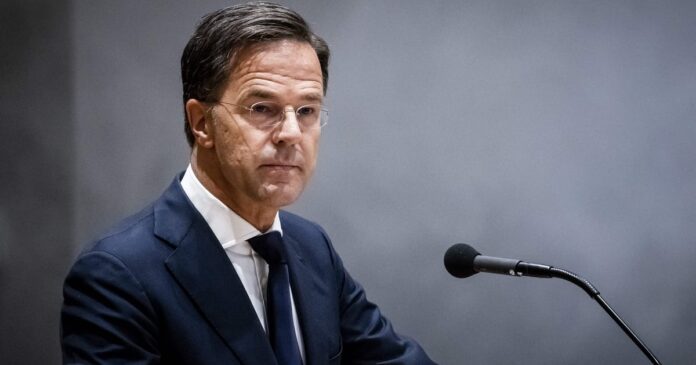After 13 years, the Netherlands’ longest-serving prime minister is switching his office in The Hague for a classroom.
Mark Rutte surprised his colleagues on Monday by announcing his retirement from politics, following his government’s collapse on Friday.
Rutte had initially said late Friday he still had the “energy and ideas” to continue, but this weekend he decided to put an end to his 17 years as leader of the People’s Party for Freedom and Democracy (VVD). “I do this with mixed feelings, with emotions. I love the team dearly. But it feels right.”
The outgoing prime minister is currently teaching social studies once a week at a local school in The Hague. “Maybe I will do that for a few days,” he added.
Rutte will stay on as a caretaker prime minister until the general election in November for the 150-seat lower house of parliament.
His 13-year tenure in power won him the nickname “Teflon Mark,” for his ability to power through a series of political crises — including a scandal over childcare subsidies which caused him to briefly resign in January 2021, only to return to power two months later after his VVD party finished first in national elections.
He is described by colleagues and friends as a manager, rather than a visionary leader, who succeeded in getting rival parties to talk and find compromises. He was the incarnation of Dutch consensus culture: pragmatic, flexible — and visionless.
However, in recent years Rutte was increasingly seen as part of the problem rather than the solution to the government’s political difficulties. His lack of openness, as well as his involvement in several controversies combined with a general loss of trust in politics, have seen his popularity sink to an all-time low.
An opinion poll for the current affairs program EenVandaag of 18,000 people found that almost three in four said it would be “unacceptable” for Rutte to return as prime minister after November’s election. Some 83 percent thought his latest coalition administration had done a bad job.
Rutte’s ability to build consensus among his four-party government has also come into question in recent times. While working on a new government immigration plan, he openly speculated about a split within the coalition even while negotiations were ongoing, according to local media.
The Dutch asylum system is suffering from a lack of sufficient reception places for new arrivals, along with a relatively high influx. But the crisis this summer is not as intense as it was last year, when for months hundreds of asylum seekers frequently slept outdoors with little or no access to drinking water, sanitary facilities or healthcare.
Politicians from D66, CDA and ChristenUnie — Rutte’s coalition partners — criticized his approach on Friday, accusing him of unnecessarily straining relations between the governing partners.
CDA party chairman Pieter Heerma said that Rutte had taken an “irresponsibly tough” stance during the asylum talks, donning an attitude that borders on “reckless politics.”
Party chair of D66 Jan Paternotte said that Rutte “was a prime minister who was always looking for solutions, not ‘my way or the highway’, but that is what happened this week.”
Rutte’s attitude has led some to suggest that the collapse is a deliberate choice to opt for early elections. Polls show that Rutte’s VVD is set to become the biggest party again, despite a rural party representing farmers’ interests landing a surprise victory in this year’s provincial elections.
“It seems to have been a very strategic move,” said Simon Otjes, assistant professor of Dutch politics at Leiden University. “While other dossiers, like plans to cut nitrogen emissions, are much more complex, migration is a more favorable topic to call it quits on.”
Rutte has faced pressure from the right wing of his own party to take a tougher stance on immigration. At the same time, two-thirds of the Dutch believe that migration rules should be stricter, making it attractive for the VVD to “make the upcoming elections a referendum on migration,” Otjes added.
Upcoming election
The next challenge for the VVD will be to find a new leader, who will steer the party through the contest this fall.
The party’s main rival will be a farmers’ protest party — BBB — that shook up the political landscape and took a majority of seats in the Dutch Senate following provincial polling in March.
In the latest political opinion surveys, BBB is neck-and-neck with Rutte’s VVD. The Peilingwijzer, which combines different polls, predicted between 23 and 29 seats for both parties. Other parties don’t even come close to that. PVV, currently the biggest opposition party, is polling at 12 to 16 seats.
The Labour PVDA party and GreenLeft party announced on Saturday that they would merge their election lists for the coming election, putting them at a projected 20 seats.
Foreign minister and leader of the CDA, Wopke Hoekstra, also announced on Monday that he will not continue as leader of his party.


